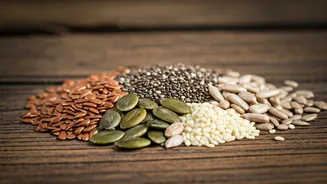Flax Seeds: Heart's Ally
Flax seeds, small but mighty, are a powerhouse of heart-healthy benefits. They are rich in omega-3 fatty acids, which play a crucial role in reducing inflammation
and lowering levels of bad cholesterol. Additionally, flax seeds contain lignans, which act as antioxidants and can help prevent damage to blood vessels. These tiny seeds can easily be incorporated into your diet by sprinkling them on cereal, adding them to smoothies, or using flaxseed meal in baking. Regular consumption of flax seeds is associated with improved cholesterol profiles, reduced blood pressure, and a lower risk of heart disease. The fiber content in flax seeds also aids in digestion and helps in maintaining a healthy weight, indirectly benefiting heart health. For optimal benefits, it's recommended to consume ground flax seeds, as this allows for better absorption of nutrients. Start small and gradually increase your intake to avoid digestive discomfort. Flax seeds offer a versatile and effective natural approach to supporting heart health.
Chia Seeds: Cholesterol Champion
Chia seeds, another nutritional champion, are packed with soluble fiber, which helps in binding with cholesterol in the digestive system and preventing its absorption. This, in turn, helps in lowering LDL (bad) cholesterol levels. Like flax seeds, chia seeds also contain omega-3 fatty acids, contributing to their anti-inflammatory effects and further supporting cardiovascular health. Chia seeds can be added to various dishes, from yogurt and oatmeal to salads and even puddings. The fiber in chia seeds also aids in regulating blood sugar levels and promoting satiety, contributing to a reduced risk of obesity, another risk factor for heart disease. Furthermore, the antioxidants in chia seeds help protect the heart from oxidative stress. Regular consumption of chia seeds, combined with a balanced diet and regular exercise, can be a proactive step towards maintaining a healthy heart. These versatile seeds offer an easy and effective way to integrate heart-healthy nutrients into your daily routine. They are known for their ability to absorb a significant amount of water, forming a gel-like substance that can enhance the feeling of fullness and help control appetite.
Pumpkin Seeds: Zinc Power
Pumpkin seeds are a great source of magnesium, which is crucial for regulating blood pressure. High blood pressure is a major risk factor for heart disease, and by consuming magnesium-rich foods like pumpkin seeds, you can help manage blood pressure naturally. Pumpkin seeds also provide zinc, which plays a role in reducing inflammation and protecting blood vessels. These seeds offer a satisfying crunch and can be enjoyed as a snack, added to salads, or used as a topping for soups. Roasting pumpkin seeds can enhance their flavor and make them even more enjoyable. The healthy fats present in pumpkin seeds also contribute to overall heart health by supporting healthy cholesterol levels. Incorporating pumpkin seeds into your diet offers a delicious and nutritious way to support your heart health. They can contribute to a balanced and varied diet that promotes overall well-being, while also offering a tasty snack option. Choose raw or dry-roasted pumpkin seeds to avoid added salt and unhealthy fats.
Hemp Seeds: Omega Boost
Hemp seeds are rich in omega-3 and omega-6 fatty acids, which are essential for heart health. These fatty acids help reduce inflammation and improve the ratio of good cholesterol (HDL) to bad cholesterol (LDL). Hemp seeds also contain arginine, an amino acid that converts to nitric oxide in the body, which helps relax and widen blood vessels, thereby improving blood flow and reducing blood pressure. Hemp seeds have a mild, nutty flavor and can be added to smoothies, salads, or used as a topping for various dishes. They are also a complete protein source, offering all nine essential amino acids. This makes hemp seeds a valuable addition to both vegetarian and vegan diets. The combination of healthy fats, protein, and minerals in hemp seeds contributes to improved overall health, including heart health. Regularly consuming hemp seeds can be a tasty and effective way to support your cardiovascular system. These seeds can be incorporated into many recipes, offering a simple way to boost nutrient intake.
Sunflower Seeds: Vitamin E
Sunflower seeds are a good source of vitamin E, a powerful antioxidant that helps protect against cell damage caused by free radicals. This protection is particularly important for the heart, as it helps prevent damage to blood vessels and reduces the risk of heart disease. Sunflower seeds also contain phytosterols, which can help lower cholesterol levels. These seeds can be eaten as a snack, added to salads, or used in baking. They offer a pleasant texture and a mild, nutty taste that complements various dishes. Sunflower seeds are a versatile and nutritious addition to any diet. The vitamin E content helps maintain healthy arteries and supports overall cardiovascular function. Eating sunflower seeds in moderation is a tasty way to get key nutrients needed for a healthy heart. They are relatively low in calories and can be a good option for those seeking a nutrient-dense snack. Choose unsalted varieties to avoid excessive sodium intake.
Sesame Seeds: Minerals Benefit
Sesame seeds are packed with minerals like magnesium and zinc, which are beneficial for heart health. Magnesium helps regulate blood pressure, while zinc plays a role in reducing inflammation and protecting blood vessels. Sesame seeds also contain lignans, which have antioxidant properties and can help improve cholesterol levels. These tiny seeds can be sprinkled on salads, used in stir-fries, or added to baked goods. They offer a slightly nutty flavor and a satisfying crunch. Tahini, a paste made from sesame seeds, is another way to incorporate their benefits into your diet. The healthy fats in sesame seeds contribute to overall heart health. Regular consumption can aid in maintaining healthy cholesterol levels and supporting the cardiovascular system. Sesame seeds are a versatile and accessible food to integrate into a heart-healthy diet. They also contain fiber, which helps regulate digestion and helps you feel full longer. Consuming sesame seeds regularly can be a simple, yet effective approach to supporting cardiovascular well-being.














